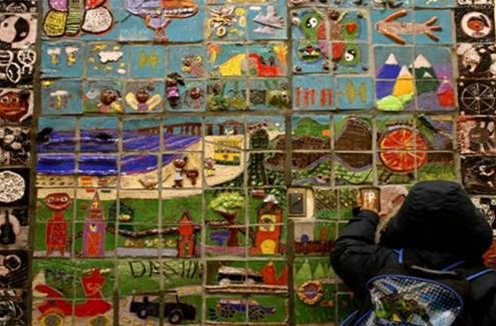Arts
 Community-Based Art as a Force for Social Change What can art do? This course will examine the potential that creative acts have to effect social, political,local and personal change through the social application of art in the context of an arts program geared towards homeless and transitional populations facilitated and directed by PSU students.
Community-Based Art as a Force for Social Change What can art do? This course will examine the potential that creative acts have to effect social, political,local and personal change through the social application of art in the context of an arts program geared towards homeless and transitional populations facilitated and directed by PSU students.
 Art and Social Change
Art and Social Change
The working Thesis for this class is that for Art, or indeed anything/anyone, to effect change in a society the work/ideas must be palatable to the majority, real and tangible in terms of outcomes and sustainable over time. We never get far when we try to change using hate, anger, force or such "clubs."
 Help with the decline in music education programs in area elementary schools by developing and teaching lessons dealing with music: for example, "The Science of Music", the "History of Music", "Music around the World", or lessons dealing with rhythm, notation, and other musical specifics.
Help with the decline in music education programs in area elementary schools by developing and teaching lessons dealing with music: for example, "The Science of Music", the "History of Music", "Music around the World", or lessons dealing with rhythm, notation, and other musical specifics.
Course Learning Objectives: Students will…
In this class, students will learn about the dynamics of sexual assault as they practice using theater as a tool for social change. Students will develop a short play about sexual assault and its prevention based on classroom readings, discussions, prior learning, and lived experiences. This play will then be performed for various campus audiences based on the Theatre of the Oppressed Open Forum model, in which audience members are invited to stop and shift the action by joining the play, thereby practicing strategies for facing challenging situations and "rehearsing for the future."
Some of the essential questions driving the curriculum of this Capstone are: How can Art be a force for social change? How is it? What limits, if any, should there be? What are the differences betwee n change and voice? What are the differences between protest and change?
n change and voice? What are the differences between protest and change?
The Portland Actor's Ensemble Grant Writing Project Students in this Capstone course partner with the Portland Actors Ensemble (http://www.portlandactors.com/). Class uses an experiential approach: that is, students learn to write compelling grant proposals by engaging in the process of writing actual proposals to be used by PAE in its pursuit of funding.
 Scott SUN and Portland State University (PSU) coordinate the "Art & Community Mapping" after-school program. PSU Fine Arts professor Sabina Haque leads the class of 20 Scott students (gr. 4-8) and 20 volunteers from her PSU capstone class. PSU and Scott students are matched for individual mentorship.
Scott SUN and Portland State University (PSU) coordinate the "Art & Community Mapping" after-school program. PSU Fine Arts professor Sabina Haque leads the class of 20 Scott students (gr. 4-8) and 20 volunteers from her PSU capstone class. PSU and Scott students are matched for individual mentorship.
